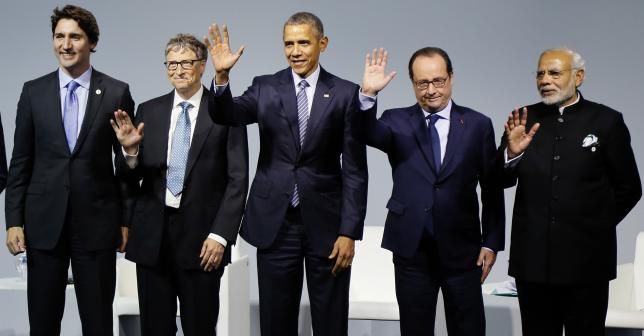During the Paris talks, experts said, negotiators must map out ways for rich countries to provide funds poor countries need to prepare to receive new technology.
 Heads of state and big-name billionaires opened the Paris climate summit with a bang on Monday, promising billions of dollars to develop new green technology to solve a key sticking point of the negotiations: financing a low-carbon future for developing nations like India.
Heads of state and big-name billionaires opened the Paris climate summit with a bang on Monday, promising billions of dollars to develop new green technology to solve a key sticking point of the negotiations: financing a low-carbon future for developing nations like India.
Yet campaigners and experts warned that it will be hard to deploy any new technologies quickly in places where they are needed most unless negotiators at the two-week UN talks can work out a deal on how rich countries will help finance this.
“I think the elephant in the room is still finance,” said Yvo de Boer, former head of the U.N. climate change secretariat.
He and others were encouraged by Monday's announcements, which opened the taps for funding a wave of research in hopes of breakthroughs such as the artificial photosynthesis Bill Gates envisions to produce liquid hydrocarbons that challenge fossil fuels. France and India launched a plan for a trillion-dollar alliance to deliver solar energy to poor nations.
Still, many countries are simply not ready to be on the receiving end of major technology transfers, experts said. For a poor country to adopt new technologies, it must have the right institutions, regulations and workforce in place.
During the Paris talks, experts said, negotiators must map out ways for rich countries to provide funds poor countries need to prepare to receive new technology. They noted that rich countries have promised to spend more than $100 billion a year beginning in 2020 to adapt low-carbon technologies and build defenses against rising sea levels, droughts and other climate-related problems.
So far, the UN's Green Climate Fund, the main vehicle to dole out this money, has a a long way to go, with just $12 billion in pledges. Scaling up that amount is a major task at the Paris talks. Rich nations want some emerging economies like China to contribute, while developing countries want target dates and accountability.
The billions promised on Monday for technology development “should not be seen as a substitute for the public finance that must be on the table to unlock a stronger agreement by the end of next week,” said Tim Gore, head of policy and advocacy for Oxfam International.
Gore said the world needs "a deal to regularly set new targets for financial and technological support for poor countries that need it.”
The US Energy Department’s Advanced Research Projects Agency-Energy (ARPA-E), which has conducted early research on technologies like fusion and advanced batteries, found that some workers in poor countries "weren't able to maintain new projects, so things fail,” said Cheryl Martin, the program's former acting director.
Even if larger nations like India and China can get over these hurdles, less-developed poor nations risk falling further behind.
“We need to ensure that competitiveness of even less developed countries is enhanced by these opportunities rather than being left behind,” said Jonathan Coony, coordinator for the World Bank’s Climate Technology Program.
Poor countries must build manufacturing capacity, research capabilities and a local workforce to develop their own green economy “rather than remaining technology takers,” Coony said.
Intellecutal property
Intellectual property rights could also pose a barrier to technology transfer. Patents fuel innovation and attract investors to companies that develop technology. But India and other poor countries have said for years that much patented technology is too expensive. They want green technologies treated as a public good.
India had pushed a plan to use part of the U.N. fund to buy out intellectual property rights for desired technologies, but the United States opposes any attempt to change the protections.
Developed countries pressing India to abandon coal and fossil fuels more quickly will "have to pick up the incremental cost” of IP rights, says Ajai Malhotra, a former climate negotiator who advises the Indian delegation.
"Developed and developing countries can move ahead by sharing about technology, and it doesn’t mean this will deprive industry in the developed world of their share of profits,” he said.
Gates said in an interview on the sidelines of the talks on Monday that green technology companies could learn from the information technology sector on how to deal with intellectual property rights.
“It’s like the IT space,” Gates said. “Some governments put the research into the public domain. Some license it. Then the start-up companies have to deal with intense competition.”
Gates said companies will watch their pricing on green technology if they want to access huge markets in India.
“If you want India to buy something you better price it cheaper than coal,” Gates said. “That’s a very tough challenge for these companies. They have to come up with something that’s cheaper than coal or else the amount they are going to sell to India is going to be pretty modest.”
Image:(L-R) Canadian Prime Minister Justin Trudeau, Microsoft co-founder Bill Gates, US President Barack Obama, French President Francois Hollande and Indian Prime Minister Narendra Modi attend a meeting to launch the 'Mission Innovation: Accelerating the Clean Energy.
Photograph:Ian Langsdon/Reuters










 © 2025
© 2025